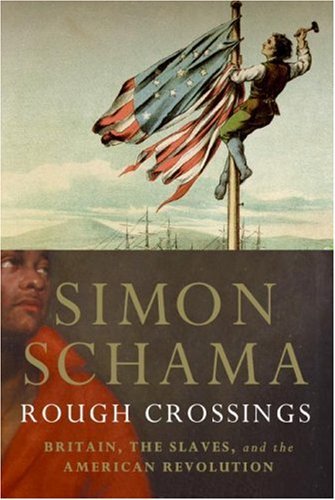
Rough Crossings turns on a single huge question: if you were black in America at the start of the Revolutionary War, whom would you want to win? In response to a declaration by the last governor of Virginia that any rebel-owned slave who escaped and served the King would be emancipated, tens of thousands of slaves—Americans who clung to the sentimental notion of British freedom—escaped from farms, plantations and cities to try to reach the British camp. This mass movement lasted as long as the war did, and a military strategy originally designed to break the plantations of the American South had unleashed one of the great exoduses in American history. With powerfully vivid storytelling, Schama details the odyssey of the escaped blacks through the fires of war and the terror of potential recapture at the war's end, into inhospitable Nova Scotia, where thousands who had served the Crown were betrayed and, in a little-known hegira of the slave epic, sent across the broad, stormy ocean to Sierra Leone.
Author

Simon Schama was born in 1945. The son of a textile merchant with Lithuanian and Turkish grandparents, he spent his early years in Leigh-on-Sea in Essex. When his parents moved to London he won a scholarship to Haberdashers’ Aske’s School where his two great loves were English and History. Forced to choose between the two he opted to read history at Christ’s College, Cambridge. Here he was taught by Sir John Plumb whose other students: Linda Colley, Roy Porter and John Brewer are now central to British historical thought. It was Plumb’s influence which instilled in him the importance of narrative and written style in order to gain an audience for history outside academia. One of the hallmarks of Schama’s work is his flair for description: ‘he gets arcane matters to walk, in fact dance, off the page’ according to fellow historian Peter Hennessy. However, his approach is contentious and invites criticism of subjectivity and populism from academic circles. Schama remained at Christ’s for 10 years after his degree, becoming a fellow and then director of Studies, before moving to Brasenose College Oxford. While at Oxford he wrote Patriots and Liberators: Revolution in the Netherlands 1780-1813 (1977), which won the Wolfson Literary Award, and Two Rothschilds and the Land of Israel (1979). At Oxford he met his wife, Ginny Papaioannou a geneticist from California. Tired of the Oxford system (he once described his experience as being ‘like a gerbil on a treadmill’) and enticed by the freedom of US Academic life, he moved to America in 1980, becoming Professor of History at Harvard. Here he wrote The Embarrassment of Riches: An Interpretation of Dutch Culture in the Golden Age (1987), Citizens: A Chronicle of the French Revolution (1989) and Dead Certainties (Unwarranted Speculations) (1991): an a unusual linking of the death of General Wolfe at Quebec in 1759 and the murder of a doctor, George Parkman, by a Harvard Professor in 1849. Citizens, which was written at lightening speed: 900 pages in only 18 months, won the 1990 NCR Book Award. However, Schama’s emphasis on the terror and violence of the revolution and his argument, that from its beginning it was a ‘sacrament of blood’, ensured it has never found a publisher in France. He is now professor in history and art history at Columbia where he has written Landscape and Memory (1996) which received the W H Smith Literary Award and Rembrandt’s Eyes (1999). The latter is a controversial reassessment of the artist which attempts to reinstate the notion of Rembrandt the genius, aiming to invoke the atmosphere as well as the historical context. In Schama’s view, as he tells David D’Arcy in Art Newspaper ‘There are some passages of sublime reinvention for which history has absolutely no answers…it seems to me pointless and trivial to pretend that it does.’ Simon Schama has also worked for the BBC on a 16 part series: ‘A History of Britain’ and has been an art critic and cultural essayist for The New Yorker and Talk magazine. He lives in New York with his wife and their two children Chloe and Gabriel.